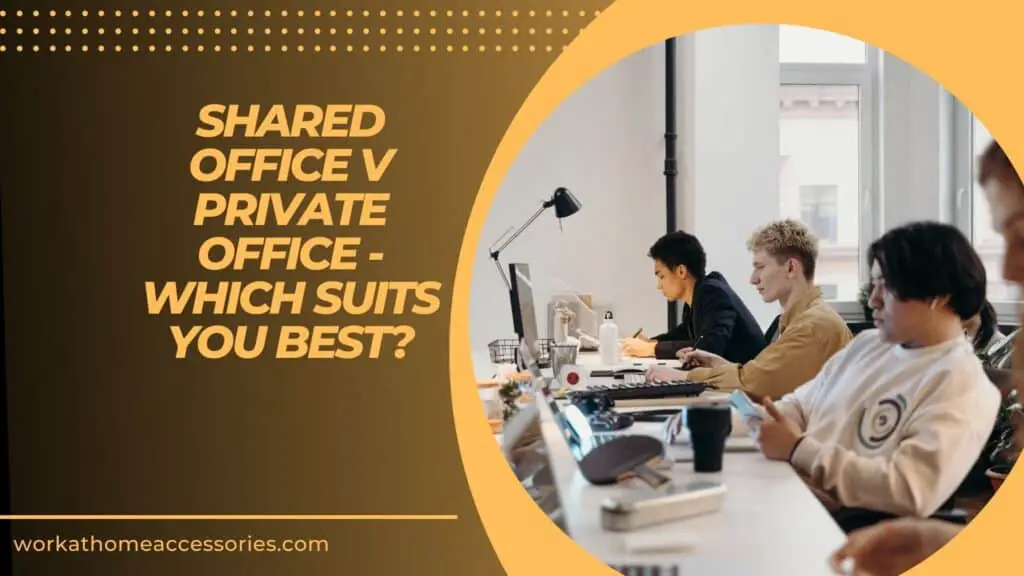If you have the luxury of choosing between a shared office v private office, then this is the article for you! Whether you’re considering how to organize your home office, your workspace for your staff or even just considering your own personal space, this will give you food for thought!
If you’re in a hurry, here is a site I recommended for office equipment with lifetime guarantee!
Shared office v private office
| Feature | Shared office | Private office |
| Level of privacy | Lower | Higher |
| Level of collaboration | Higher | Lower |
| Level of focus | Lower | Higher |
| Level of productivity | Lower | Higher |
| Level of noise | Higher | Lower |
| Level of space efficiency | Higher | Lower |
| Level of hygiene | Lower | Higher |
| Level of office layout control | Lower | Higher |
It sounds as if the private office is the better option when compared to the shared office in the comparison table above. Let’s take a deeper look and see how true that is. Plus, find out what factors are person-dependent and which scenarios warrant a shared or private office. You often only get to set it up right once, so read on so you can set your office up right first time!
On average, office workers are losing 86 minutes per day due to distraction according to a study of 10,000 workers questioned. Source

Shared office v private office level of privacy
In a shared office, there will be a lower level of privacy compared to a private office. This means that if you need to have confidential meetings or calls, you will probably need to move to a meeting room. Or alternatively, schedule the meeting for a time when you have the shared office to yourself.
Or else talk in code…
Private offices do offer a greater level of confidentiality and are often essential for certain types of work, e.g., conversations on finances, human resources, or sensitive data.
However, bear in mind that most offices are not soundproof.
Recommended product: Corner desk with lifetime guarantee on Office Furniture2Go
Shared office v private office level of collaboration
Being in a shared office makes it much easier and encouraging to collaborate with your colleague. This is particularly beneficial if you work on the same project or in the same department.
This can spur helpful and informative conversations to occur and make it easier to troubleshoot problems.
This is probably one of the biggest advantages of sharing an office.
Such collaboration is less prevalent in a private office. Therefore, you may resort to phoning your team or take notes of the questions and ideas you want to ask people when you see them next.
Shared office v private office level of focus
that when working in a shared office, concentration levels are much lower than working in a private office.
One study found that 31% of workers have to leave their office to be able to concentrate and get their work done.
Distractions from the other person working, on meeting calls and possibly having people call to their desk can all remove you from being focused on your work.
Having discussions and answering queries from your office companion is also a common source of distraction.
On top of that, there will also be some chit chat which can consume time too, depending on if you are a chatty Kathy or you share an office with one.
What’s problematic about sharing an office is that when your focus is interrupted, it can be rather difficult to refocus on your work.
This may not be as big of an issue if you perform primarily light work, e.g., answering emails, working on short and quick tasks.
However, such distractions can hemorrhage your progress if you’re trying to engage in deep work. Such work includes writing a report, coding, researching a topic or trying to digest a comprehensive topic.
This tends to lead to worker dissatisfaction if they cannot perform their work.
Related: Open Plan Office V Cubicle – Plus, Which Is Better?
Shared office v private office level of productivity
With an onslaught of distractions keeping you from your work, it’s inevitable that your productivity levels will also take a hit in a shared office.
One study stated that 1 in 3 workers feel distracted when working in an open office area.
These effects are minimized in a private office. Therefore, if you do need to perform deep work, a private office in a quiet area could catapult your productivity to new heights.
Shared office v private office level of noise
The more people in an office, the greater the noise levels will be.
Private offices have noise levels of around 40 to 45 decibels (equivalent to a fridge). Whereas a shared office reaches approximately 60 – 65 decibels (equivalent to a conversation.
This noise may be comforting to some workers who cannot stand the sound of complete silence.
However, again, if you are easily distracted or trying to focus, noise can be a source of irritation and distraction while you work.
If this sounds like you, then you could make the argument that a private office would help you work better and more efficiently.
Shared office v private office level of space efficiency
Shared offices make for more efficient use of office space. We’ve all seen offices where one person occupies a footprint that could easily cater to two plus office desks.
When office space is limited and you are trying to fit more people into an area, a share office is the most effective way to achieve that.
This is often the case where workers cannot work from home, or the company is paying for office spaces.
Unless private offices are very compact, they are rarely going to match or be more space efficient than a shared office.
Recommended product: 48″ 2-Person Workstation – with lifetime guarantee on Office Furniture 2 Go
Shared office v private office level of hygiene
People all get sick and carry colds, flus and other ailments with them at some stage or another. If you are sharing an office with someone who is suffering from such conditions, it’s almost inevitable that you will catch it if you sit too close to them.
However, if there is good ventilation in the room, this can minimize your chances of getting sick too.
Presenteeism (attending work while sick) does still occur today, but possibly to a lesser extent.
This is combined with the fact that workplaces are adding better ventilation to their shared office areas following Covid. Ultimately, this makes for an environment where there is less sickness and cleaner air.
If you have your own private office, you are less likely to become sick.
Plus, you can be in full control of the housekeeping and how clean and tidy the office is.
When you share an office, you can sometimes only control your own desk in terms of tidiness.
Shared office v private office level of office layout control
In a shared office, many changes that you would like to make would often have to be run by your companion. Especially ones that directly impact on them, e.g., reorganization of the desk layout.
However, with a private office, you only have to please yourself. Therefore, you can reorganize the office to whatever orientation you desire.
This can come in useful when feel like a change or the original desk location causes issues, e.g., glare from sun, draughts etc.
Tip: Having a desk divider or object between both desks can reduce how much you see and how easily you get distracted.
Conclusion
Private offices are generally a better option than shared offices. Especially for people who need to have privacy and quietness, minimal distractions and control of their workspace.
That said, if your priorities are to encourage collaboration and space optimization, shared offices are a better choice.
In reality, a mix of both collaborative and private workspaces are needed depending on the work you are performing. Hopefully, this is something more workers and workplaces start recognizing.
If you’d like to broaden your knowledge further on kneeling chairs or learn more about wobble stools, then these articles below are without a doubt worth a look!
Here are some other useful articles I wrote that you should go check out:
- Pros And Cons Of Sharing A Home Office + Surprising Insights
- How to declutter a home office – 8 proven steps
- Setting up a home office checklist
- Essential work at home gadgets – 5 must-haves!
- Is It Better To Work By A Window? – Proven Expert Studies!
Recommended Products:
- Corner desk with lifetime guarantee
- LED light, flicker-free, dimmable + lifetime warranty
- Bivi Table for Two by Office Designs
- 48″ 2-Person Workstation – Office Furniture 2 Go
- CoolMesh Pro Multi-Function Chair (link on OfficeFurniture2Go)
